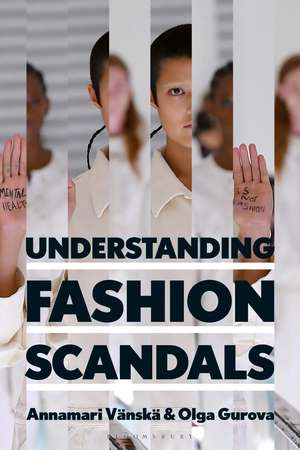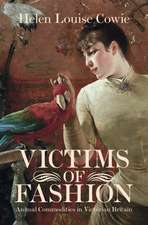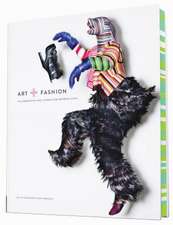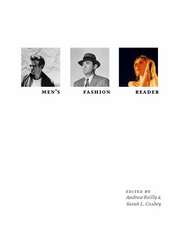Understanding Fashion Scandals: Social Media, Identity, and Globalization
Autor Professor Annamari Vänskä, Dr Olga Gurovaen Limba Engleză Hardback – 24 ian 2024
Preț: 466.81 lei
Preț vechi: 575.94 lei
-19% Nou
Puncte Express: 700
Preț estimativ în valută:
89.36€ • 91.96$ • 75.33£
89.36€ • 91.96$ • 75.33£
Carte disponibilă
Livrare economică 07-21 februarie
Preluare comenzi: 021 569.72.76
Specificații
ISBN-13: 9781350248960
ISBN-10: 1350248967
Pagini: 248
Ilustrații: 23 bw illus
Dimensiuni: 156 x 234 mm
Greutate: 0.45 kg
Editura: Bloomsbury Publishing
Colecția Bloomsbury Visual Arts
Locul publicării:London, United Kingdom
ISBN-10: 1350248967
Pagini: 248
Ilustrații: 23 bw illus
Dimensiuni: 156 x 234 mm
Greutate: 0.45 kg
Editura: Bloomsbury Publishing
Colecția Bloomsbury Visual Arts
Locul publicării:London, United Kingdom
Caracteristici
Explores the shift from fashion brands using shock value as an effective marketing tool and a fast-track to building an 'edgy' reputation, to the social-media-driven scandals of contemporary culture that can sink a campaign overnight.
Notă biografică
Annamari Vänskä is Professor of Fashion Research at the Aalto University in Finland. She is the author of Fashionable Childhood (Bloomsbury, 2017) and the co-editor of Fashion Curating (Bloomsbury 2018). Vänskä's work spans fashion as embodied culture and digitalization of fashion. She is currently the Deputy-PI of the consortium "Intimacy in Data-Driven Culture" and PI of the research project "Intimacy, Creative Work and Design," funded by the Strategic Research Council at the Academy of Finland (2019-2025).Olga Gurova is a Senior Researcher in circular economy and consumer citizenship at Laurea University of Applied Sciences in Finland. She is the author of Soviet Underwear: Between Ideology and Everyday Life (2008) and Fashion and the Consumer Revolution in Contemporary Russia (2015). Gurova works on projects aimed at building an ecosystem of sustainable fashion through the enhancement of business models and consumer behavior in Finland and the Baltic countries, financed by Uudenmaan liitto and Interreg.
Cuprins
IntroductionThe Two Types of Fashion ScandalsScandal as Politicization of FashionDecolonizing FashionPositioning OurselvesEpistemic PositioningsStructure of the BookPART ONE THE FASHION SCANDAL-PAST AND PRESENT1. Framing the Fashion Scandal: The Platformization of FashionVisualization of FashionMediatization of FashionSocial Media and the Platformization of FashionThe Instagramification of Fashion2. Fashion Brands Negotiating Identity PoliticsCultural Approach to Brands and BrandingNegotiating Identity Politics3. Changing Strategies of Fashion Brands: From Shock to ScandalA Short History of the Fashion Scandal: Deliberate ShockContemporary Shock: The Unintentional ScandalSocial Media and New Identity PoliticsDismantling White Privilege and Introducing Intersectionality to Fashion4. Emotional Effects of Social Media on Fashion: Calling-out and CancelingEmotional BrandingEmotional Reactions and CancelingNew Cultural Intermediaries and the Creation of the Unintentional ScandalConsumers Empowered to Speak UpWhat if a Brand is Canceled?PART TWO CASE STUDIES5. RussiaLove is (Not Just) LoveFeminist Resistance in a Conservative WorldRace Across Time and Space6. FinlandMaternity Clothes for 12-Year-Old African GirlsFlirting with Fascists7. Global ScandalsWhose Identity? The Problem with "Cultural Appropriation"Casual Racism: "Eating with Chopsticks"Blackface and Structural Racism in the Fashion Industry"Mental Health is not Fashion"PART THREE THE RESPONSE TO FASHION SCANDALS8. Just Don't Do It!Corporate World Response, Part One: Corporate Social ResponsibilityCorporate World Response, Part Two: Brands as Political ActorsCorporate World Response, Part Three: Diversity OfficersAcademic Response, Part One: The Danger of "Diversity Washing"Academic Response, Part Two: the "Glossification of Diversity"Academic Response, Part Three: Reimagining the Fashion CurriculumPolitical Response, Part One: Supply Chains and Human RightsPolitical Response, Part Two: Advocacy Groups BenchmarkingBusinessConclusion: A Call for Cultural and Social SustainabilityPART FOUR EPILOG9. The Counter NarrativeHeidi Karjalainen, FinlandErvin Latimer, FinlandJahnkoy, USAClaudia Lepik, EstoniaMuslin Brothers, BelgiumKristian David, SwedenBibliographyIndex
Recenzii
This is a fresh, updated and comprehensive book on the phenomenon of fashion scandals, which has gained media and consumer attention in recent years. The reader will find both rich case studies and an analysis of how fashion scandals deal with broader processes such as mediatization and cultural appropriation.
A thought-provoking read looking at an important dynamic within the contemporary fashion and advertising worlds. The authors not only interrogate a variety of scandals, but offer an important framework for understanding contemporary fashion communication.
This is a smart, rich and engaging analysis of fashion scandals as engines of media attention and as sites of everyday politics. Recommended reading for everyone interested in how fashion matters in the making of identities, cross-cultural connections and sustainable futures.
A timely and original introduction to the complex politics of the "fashion scandal," investigated as a brand strategy in the age of global communication and social media.
A thought-provoking read looking at an important dynamic within the contemporary fashion and advertising worlds. The authors not only interrogate a variety of scandals, but offer an important framework for understanding contemporary fashion communication.
This is a smart, rich and engaging analysis of fashion scandals as engines of media attention and as sites of everyday politics. Recommended reading for everyone interested in how fashion matters in the making of identities, cross-cultural connections and sustainable futures.
A timely and original introduction to the complex politics of the "fashion scandal," investigated as a brand strategy in the age of global communication and social media.

















